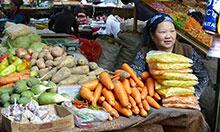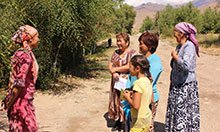Healthy Nutrition Behaviors in Kyrgyz Republic Begin with Those Who Promote Them

A Growing Trend
A diverse diet that includes essential vitamins, minerals, and other nutrients is key to ensuring proper growth and development. But lack of a nutritious diet doesn’t just result in undernutrition—over-nutrition caused by over consumption of highly processed food devoid of nutrients can lead to “hidden hunger,” depriving the body of those essential vitamins and minerals. According to the 2012 Kyrgyz Republic Demographic and Health Survey, 31 percent of women and 9 percent of children in the Kyrgyz Republic are overweight or obese while 18 percent of children under five are chronically undernourished.
I’m happy SPRING is promoting healthy eating and reducing junk food [in] communities. I decided to start with myself and my family.
-Firuza Fazilova, volunteer coordinator
Junk food consumption is a growing trend in the Kyrgyz Republic, especially in urban areas. These foods are often processed or prepackaged and contain high amounts of fats, sugar, and salt (e.g. instant noodles, biscuits, sweets, soft drinks, and savory snacks). The empty calories found in junk food displace more nutrient-rich foods in family diets, contributing to unhealthy weight gain, which can lead to overweight and obesity.
A New Perspective
Since 2015, volunteer coordinator Firuza Fazilova has worked with the USAID global nutrition project, SPRING, to teach the importance of balanced diets for the future of the Kyrgyz Republic. Working with three other coordinators, Firuza trains approximately 500 community volunteers in Ala-Buka rayon of Jalalabad oblast on nutrition and hygiene topics every other month. The volunteers then conduct household visits and community meetings to raise awareness of nutrition and hygiene among the population with materials such as SPRING’s Healthy Nutrition for Children and the Whole Family Cookbook to help families improve their diets.
Firuza knew the key messages in these trainings would be beneficial for mothers and children, but the topics of dietary diversity and junk food reduction struck a personal chord. Both Firuza and her husband work outside of the home, so they often purchased prepackaged meals or fast food to feed themselves and their four growing children, who range in age from 5 to 16 years old. Having learned about the harms of consuming too much junk food, she realized it was time to make a change.

Change Starts at Home
Following recipes from SPRING’s cookbook, Firuza began cooking nutritious dishes for her family and made an effort to remove unhealthy snacks from her home. “People just tend to overeat, which is a problem now that we live lifestyles that are less active,” she said. “I’ve really learned about portion sizes and diversifying the diet from SPRING. I tried out a recipe for cauliflower puree and my family really enjoyed it. Before I thought this dish wouldn’t be enough for one person, but I followed the cookbook’s recommended serving size and was surprised to see it could easily feed four people.”
Firuza also has a small garden near her home. After using the cookbook, she decided to expand the varieties of vegetables and fruits she grows to include beets, cauliflower, eggplant, carrots, and peaches. This way, she will have the ingredients on hand to make healthy recipes. She even started growing kidney beans to supplement her fruits and vegetables with a protein-rich legume.
Reaching Communities
Firuza is just one of 27 coordinators who work with more than 2,600 community volunteers on an ongoing basis, providing training and support for their outreach activities to improve nutrition. With each new hygiene or nutrition topic, SPRING reaches over 120,500 caregivers and 20,000 children under two years of age across Jalalabad and Naryn oblasts through household visits and community meetings. Firuza’s experience serves as a reminder that behavior change starts with individuals, and that it’s never too late to commit to healthier eating habits.

